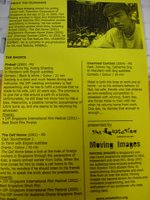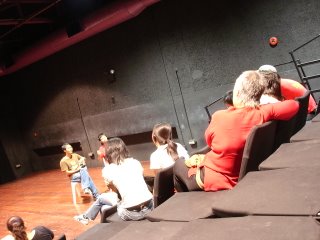 |  |
Director Han Yew Kwang had his feature film Unarmed Combat make its debut at Cine.SG, and as a follow up to the premiere, 3 of his short films were given a screening at the Substation's Guiness Theatre today, after which a Q&A session was conducted for the audience to pose some questions.
Here, I'll mix my review of the shorts, as well as nuggets of information shared from the Q&A Session
Pinball
Pinball, or the Mandarin title directly translated as "Man in his 40s", tells the story of a driving instructor / tester, and the relationship with his dutiful wife, and his karaoke-mad father. As his 20th wedding anniversary is approaching, he is made to remember about a promise to his wife, that he will learn how to ride a bicycle, and ride her around Bedok Reservoir (or to me it looked like it was) 5 times. As the deadline looms, the tables are turned as the instructor becomes a learner as he grapples with riding a two-wheeler, to comedic and dire consequences.
It's a light hearted comedy, with witty jokes and dialogues making up for the lack of slapstick. Also starring Johnny Ng (male lead from Unarmed Combat), this movie has the potential of being expanded into a feature film, and it's already in pre-production stage. I felt that its theme of love is universal, and it has some social critique built into its conversational pieces very nicely too.
Filmed in black and white, with flashbacks in colour, this was a deliberate attempt to contrast between the mundane now (hence b/w) and the more colourful past in which life was more interesting and happy with his wife. I suppose this could probably be a technique adopted to the feature as well? It remains to be seen.
Why the title Pinball? It alludes to the analogy that in the game of Pinball, the introductory trajectory of the ball is that along a straight tunnel - reflecting the life of the lead Jiaqiang, before he embarked on his quest to fulfll his promise. Similarly, things gets more interesting for the pinball once it emerges from the tunnel, and goes on its random path within the game, as will Jiaqiang's life take during the course of the movie. Perhaps as Yew Kwang puts it, it should be clearer when the film explains itself and its title.

Unarmed Combat / Tie Nan (direcctly translated as Metal Man)
I shall refer to the short film title as Tie Nan, so as not to confuse between the short, and the feature length film. Tie Nan offered the opportunity to compare which scenes made it to the feature, as well as to understand how a plot meant for a short, could be extrapolated into a feature length movie with more characters and situations added to the mix.
The crux of the movie is all here - that of the arm wrestling competition for women, and of the slapping of the husband in front of his friends. Other than that, there were some changes made for the feature, such as Metal's occupation, as well as the roles of his colleagues/employees. However, while the story suggested moments to the inevitable finale, it sort of hung halfway without much closure. The feature becomes superior in terms of opportunities for character development, as well as an expanded supporting cast to make it all interesting. The editing style of the feature too overtakes the short, which utilizes more stylized transitions from scene to scene.
But there will always be a comparison between the feature length film, and the short it was extrapolated from. Just like Royston's 15, many here preferred the short rather than the feature. For me, the feature Unarmed Combat worked a lot more than the short Tie Nan, because the short had plenty of questions left unanswered, as well as plenty of blank spaces in which the feature filled up nicely.

The Call Home
The Call Home examines the background story of one of the many foreign workers who seek employment as construction workers in Singapore. This movie is vastly different from the other two, as it is not a comedy, but a rather quiet, serious story. The tale focuses solely on protagonist Kasi (Soundrarajan J), a new migrant worker, as we follow his adjustments to life in a strange new world, and for an audience to learn why he's here, and how the weight of the world is felt on his shoulders. I felt the movie was in 2 parts, the first being silent discovery in almost very quiet moments in many scenes, while in the latter half, it was a grippingly sad revelation to the audience about his background and worldly troubles.
This short is Yew Kwang's graduation film, and he selected this script amongst the 3 being offered. He wanted to know what's life for a foreign construction worker in Singapore, and thus this script had given him an opportunity to do so. He actually had a casting call, and real construction workers turned up, whom he would have preferred to select, but alas, obvious scheduling issues prevented it from happening. Thus most of the cast are professional stage actors.
Yew Kwang joked about the film being in Tamil, a language he obviously couldn't understand, and they got an Indian translator to listen to the dialogue, while they solely paid attention to the acting. Until the translator didn't turn up for subsequent shoots and they had to blindly trust what the actors had said in their dialogue!
There was a key scene in which Kasi had a long conversation with his wife in India, and the camera was focused solely on his back. For obvious reasons, there wasn't space behind the phone booth used to mount the camera. But on a different level, the audience experiences what the wife would have felt, only able to hear his voice and tone, and cannot see his expression.
Other nuggets of info
- The use of colours (or lack thereof) is to reflect the mood when Kasi is about to make the phone call, and thereafter.
- The finale at the mass film screening was done in one take, and then it rained. Catherine Sng suggested to screen this short for them at the open field.
- The timeline was shown in the short to give it a documentary feel, as well as to show the changes to a new migrant worker in a short period of time.
- It was intentional not to show the face of Kasi's workplace supervisor. Not that it wasn't shown because of a fear of backlash on his treatment, but since the story was deliberately left ambiguous most of the time, it was decided that showing the scene with the supervisor in the usual manner, would have disrupted the flow. They did shoot the scene the usual way though.

The Q&A was wrapped up, and those who had not watched Unarmed Combat, were informed that the last screening was at the National Museum Gallery Theatre that evening. All in all, great afternoon being given the opportunity to watch the shorts, and being able to see first hand how an idea conceived as a short, could have the potential to be developed into a feature.
Would be interesting to see how Pinball, his next feature, would turn out to be like. Look out for it!

No comments:
Post a Comment